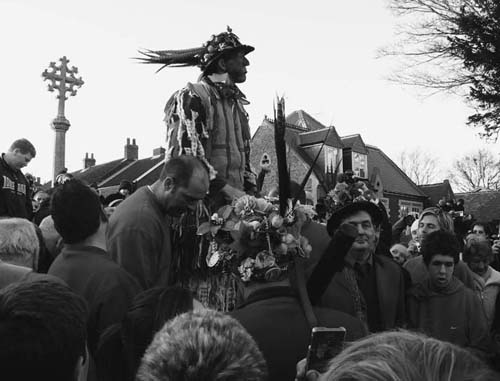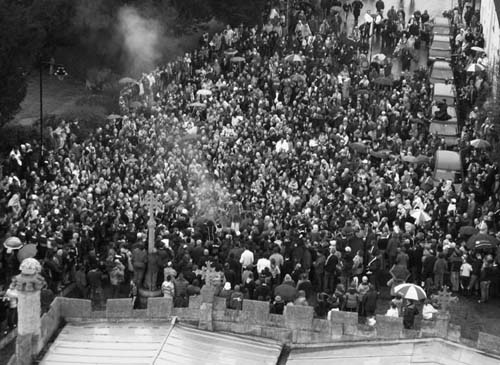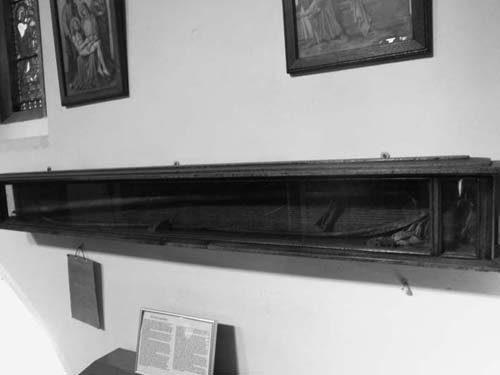Folklore of Lincolnshire (29 page)
Read Folklore of Lincolnshire Online
Authors: Susanna O'Neill


Photograph of the fool at the Haxey Hood celebration. (Kindly donated by Arthur Franks.)

The vast numbers attracted to the Haxey Hood annual event. (Kindly donated byArthur Franks.)
Many believe the game is linked to the ancient festival of John Barleycorn – or the Green King, as the song ‘John Barleycorn’ is ritually sung. These are ancient traditions of fertility and the cycle of the year, certainly apt for a farming community. Jeremy Hobson has another similar theory: ‘In Viking culture a bull was often sacrificed at this time of year and its head (hood?) was used as a sort of football in the hope that its blood would ensure a good growing season.’
7
There is an annual banquet on this date, named the Lincoln Cake Ball. It has been held every year since 1795, apart from during the two world wars. Held in the County Assembly Rooms in Bailgate, it is a dinner to which one has to have an invitation from the mayor.
Plough Sunday and Monday were the first Sunday and Monday after twelfth night and were a farming tradition to bless the plough. It was decorated and paraded around the village.
The eve of the feast of St Agnes, the patron saint of girls, falls on this day. There used to be an important tradition for young women to use this night to perform certain rituals in order to catch sight of their future husbands. For example, girls would sow barley seeds under trees and chant:
Barley, barley, I sow thee
That my true-love I may see;
Take thy rake and follow me.
If performed correctly, the girls should then dream of their betrothed that night.
This date signifies a more modern Lincolnshire festival, the Lincoln Australian Breakfast. This tradition began due to a visit the mayor took to Australia in 1991. On this day there is a huge breakfast situated on the beach with people dressed up and some in costume. The mayor was so taken with the idea that he brought it home to Lincoln. On the Sunday nearest to the 26th, the Lawn Centre now holds a breakfast celebration for up to 1,600 people, with Australian music, dress and custom being the order of the day.
‘A February spring is worth nothing.’
February is the month for the farmers to clean out ditches and get ready for the year ahead but there was always a fear that if it was a warm February that things would come into flower early and then be killed off by a later cold snap, hence the saying above. Along with this was the idea that if it was warm enough for ‘the gnats [to] fly in February the farmer will beg at Harvest’.
Candlemas, the midpoint of winter, is a traditional Christian festival, to celebrate the purification of Mary, forty days after the birth of Jesus. It was a time to bless the candles in a commemoration of the return of the light. As with other counties, Lincolnshire celebrated this day with candle processions, feasting and horse trading. One of the old beliefs was that the candles blessed at Candlemas held such special properties that they could help cure illnesses. For example, if someone had a sore throat they should lay the blessed candles in a cross shape across the afflicted throat and they should be cured.
Again as in all counties, this day is celebrated by lovers, and in Lincolnshire in particular people used Valentine’s Day to perform a number of rituals to determine their future partners. For instance, one could tie a strand of hair through a ring and sleep with it under the pillow in order to dream of a future spouse. In Gainsborough there was a custom of pinning five bay leaves to your pillow, one at each corner and then one in the middle, in the belief you would then dream of your husband to be. In Coningsby, bachelors would wear a small yellow flower upon their lapels to let the ladies know they were available. Wearing one would signify the prediction that you would soon be married. Tradition also spoke of the idea that the first unmarried man a girl saw that morning would be the one they would marry – and too bad if it was someone they disliked!
The sending of a valentine was popular too, as Gutch and Peacock show us with an example of a ditty:
If you love me, love me true;
Send me a ribbon, and let it be blue.
If you hate me let it be seen;
Send me a ribbon, and let it be green.
8
The country over this was the day when it was seen as acceptable for the lady to ask the man to marry her. In Boston it was a known tradition that if a girl leapt onto a man’s back it was her way of proposing and no words were needed. To agree, the man would then leap on her back. This could be due to the term ‘Leap Year’. If a man refused the proposal, some traditions said he must buy the lady a silk dress in recompense. As Sutton points out, although an expense, this was a much cheaper option.
March comes in like a lion, goes out like a lamb.
It was often believed that if there was bad weather at the beginning of this month then it would improve, bringing milder conditions by late March and into April.
This day marks the celebration of the first day of spring. The Lincolnshire tradition was to throw clods of earth across the fields to awaken the sleeping spirits in the earth. The four corners represented the four compass points and sowing and planting for the year began. The River Trent, which flows into the Humber twenty miles away, feels the equinox effects of the tidal bore, also known as the ‘Aegir’, after the Norse God of the sea. Felt also at Gainsborough, there was once a custom of throwing a piece of silver into the water at high spring tide as a toll, to prevent ever drowning there and also to soothe the fury of the flow.
The ‘Lincolnshire Handicap’ horserace, starting in 1849 in Lincoln, was a very popular event, lasting until the 1960s. It was then moved to the Doncaster course and is still the first major race of the flat racing season today.
This is Thomas Kendall Day, named after the vicar of Louth in 1534, who opposed the Dissolution of the Monasteries. He was part of the Pilgrimage of Grace rebellion,
which unfortunately failed, and he was hanged in 1537. Lincoln Cathedral commemorates his death every year with a service on his anniversary.
This was once a mammoth event, taking place sometime between February and Easter, whereby the whole contents of the house were cleaned and every household took part in this annual ritual. Every curtain was taken down and washed; carpets were taken outside and beaten; rooms whitewashed, painted and redecorated. It was such an important tradition that people would not enter one another’s houses until it had been done. Since the modern inventions of vacuum cleaners and washing machines, cleaning is much easier and done much more regularly, thus the need for this huge upheaval is lessened, yet still we use the phrase ‘spring cleaning’ whenever we do a good clear out.
As a movable event, this took place on the Saturday before Shrove Tuesday. A special cake was made, rather like a pancake but thicker and more crumbly, made with oat flour. The cakes were called ‘brustins’ and were often served with honey poured across although some people ate them with fish. Eggs were once forbidden during Lent so these cakes and pancakes were a good way of eating them up. The money saved on buying eggs for the next six weeks was given to the poor. Many towns in the country had a pancake bell and in Lincolnshire this was apparently rung as a signal for housewives to begin to prepare their pancake batter.
An indication of how cold this time of year was then (and can still be today); one popular batter recipe included two tablespoons of freshly fallen snow. When added right at the end, this was thought to make the batter light. The first pancake tossed would traditionally be fed to the cock as a reminder that Peter denied Jesus three times before the cock crowed. The daughter of the house watched this custom closely, as the number of hens that arrived to help the cock eat it signified the number of years she would remain unwed.
At one time it was also the tradition to give school children an orange on Shrove Tuesday, hence the use of the name Orange Day. Certain places used to have a game, the Lug and Bite game, on this day, whereby children would crowd around the schoolmaster whilst he threw an orange up into the air. The child who caught it took a bite and then had to throw it back up. If he kept hold, taking more than one bite, the other children were allowed to lug (pull) his hair and ears until he threw it up again.
Once also known as ‘Refreshment Sunday’ as it was used as a break from the abstinence of Lent. Another name was Simnel Sunday, after a traditional, rich almond cake. Thick almond paste was spread in the middle and on the top, along with eleven small balls, to represent the apostles (barring Judas) and also the number of months the girls were away from home in the days when the roads were bad and transport was poor. They often had to work in another town but came home on Mothering Sunday, which was like a family reunion day.
Apparently originating over a thousand years ago, this fair, often held during the week after Mothering Sunday, appears in Stamford. Now more of a funfair than the market it used to be, it moves on to Grantham the week after and then heads north for the summer. Some say it is now the largest street fair in Lincolnshire. The town mayor opens the festivities and rings the Mid-Lent Fair bell to announce the start of the six-day event.
This is now a lost custom but was very popular through the 1800s. A gad-whip is a long whip used by ploughmen to drive their oxen faster. Every Palm Sunday the 10-foot gad-whip was cracked three times in the church porch by the Lord of the Manor of Hundon. Apparently, the first time was for the first lesson of Easter, then the second after the second lesson, involving a purse with thirty pieces of silver. The custom ceased in 1846 but one possible explanation for the tradition was that it was penance for the accidental death of a boy by the Lord of the Manor and this personal act became bound up with the tenure of the land. There was controversy at the time, some people saying it was an indecent act to perform in the church, whilst others argued it was in keeping with the Easter theme. The thirty coins were symbolic of Judas’ betrayal and the cracking of the whip three times was a reminder of the cock crowing and Peter’s denial. The controversy seemed to fuel interest and at the 1843 service over a hundred people turned up to see the curious custom.
If you ever hear any of the older generation in Lincolnshire call a child with a dirty face a ‘Molly Grime’ it is a reference to a very old tradition linked to Good Friday. The washing of an effigy of the dead Christ was a tradition every Good Friday, along with littering his bier with flowers. ‘Malgraen’ meant ‘holy image washing’, but became corrupted to Molly Grime.
Good Friday was also the day for baking hot cross buns and as it is a ‘holy’ day, the buns are said to contain magical properties. The
Lincolnshire Life
magazine tells of a
woman from Lincoln who held that one should always bake thirteen buns, keeping one back in case anyone in the family should become ill during the year.
9
If they do, the idea was to scrape some of the top off the bun, add it to a glass of warm milk and drink it before bed. By the morning the illness should have disappeared.

